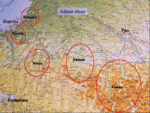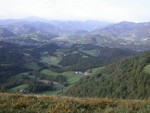The Coweeta LTER – Hydrosystèmes Pyrénéens SA Collaboration
Including a social dimension to long-term ecological research is increasingly recognized as critical to understanding and managing ecological systems since “most aspects of the structure and functioning of Earth’s ecosystems cannot be understood without accounting for the strong, often dominant influence of humanity” (Vitousek et al. 1997: 494). The challenge is determining how to integrate data, information and knowledge as researchers move beyond traditional disciplinary and site boundaries.
We are facing the challenge in a collaboration between the Coweeta LTER and the Hydrosystèmes Pyrénéens Site Atelier in southern France by integrating ecological, physical and socioeconomic information to achieve a comprehensive understanding of land use and land-use change.
The LTER Core Research Areas—primary production, population studies, movement of organic matter, movement of inorganic matter, and disturbance patterns—do not explicitly require the incorporation of a human component to LTER research. There has consequently been little structured or systematic social science research in the LTER Network, and few attempts to either identify integrated science questions or conduct cross-site studies. The mandate of the Zones Ateliers network, however, is to explicitly focus on ecosystems that have been subject to the effects of human activities (Lévêque et al. 2000). Each Zone Atelier comprises a number of individual research sites (Sites Ateliers) in a geographic unit (e.g., watershed, gradient, ecoregion, etc.) where intensive data collection achieves a representative sample of the social-ecological system of said geographic unit.
Experimental and observational research activities at the Coweeta LTER and the Hydrosystèmes Pyrénéens SA are carried out at paired sites with gradients representative of the socionatural variation in factors relevant to land use and land-cover change and disturbance regimes across each study region. Remote sensing analysis of coarse- and fine-grained resolution imagery with ground-truthing is used to integrate site and gradient results with regional-level analysis. The purpose in both cases is to develop an information and knowledge system that permits management of heterogeneous data sets, common access through the web to all datasets by project investigators, and identification of driving variables. To achieve our research objectives depends on a scientific information system that not only archives data and information, but also fosters its use.
Our purpose in collaborating is to promote and enhance understanding of long-term phenomena across regional, national and oceanic boundaries contributing scientifically to ecosystem management. The distinct advantage of the collaboration between researchers in the Southern Appalachian and Pyrenees Mountains is that both sites present ideal natural laboratories for evaluating the synergism between the socionatural template and the resulting patterns and processes in ecological and socioeconomic systems. The particular strength of our sites is that we bring ecological and social scientists together as equal partners in the development of an integrative approach to the study of ecosystems.
The Coweeta LTER - Hydrosystèmes Pyrénéens SA collaboration facilitates interaction between scientists across disciplines and sites by sharing knowledge and expertise based on a common set of research priorities, and the need to solve similar methodological and conceptual issues. Our structured and systematic approach to integrated science questions also promotes comparability of observations and experiments and encourages data exchanges that transcend traditional disciplinary boundaries. We ultimately anticipate a fundamental impact on the education and mentoring of the scientists-intraining represented by the students working at each site.
References
Lévêque, C. et al. 2000. Les zones ateliers, des dispositifs pour la recherche sur l’envrionnement et les anthroposystèmes: Une action du programme “Environnement, vie et sociétés” du CNRS. Natures, Sciences, et Sociétés 8:44-52.
Vitousek, P. M. et al. 1997. Human domination of Earth’s ecosystems. Science

 Enlarge this image
Enlarge this image
